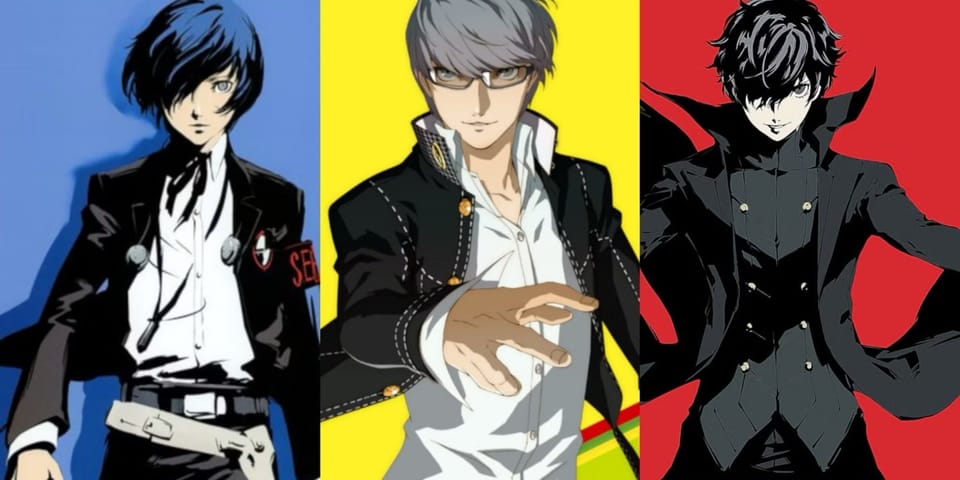The Persona games are pretty helpful (at everything)

The Persona games, imo, are splendid. I’ve played Persona 5 Royal, working through Persona 4 Golden now, and might pick up Persona 3 Reload at some point. Even heard rumors that the 6th entry is coming next year. Neat.
But as I’ve played through them, the mechanics have resonated with me in a way that most other games haven’t. This is to the point where I feel these games, through their stories and mechanics, can help us in real life.
Coping mechanisms, getting things done, managing goals and responsibilities, possibly even the secrets to true happiness.
All from a series of games that, on the surface, seem like a bunch of teenagers using the power of friendship to kill god.
I felt like sharing my notes on the matter, both for enthusiastic fans and curious onlookers.
Social Links
One of the base mechanics of the series (and one that separates it from the Shin Megami Tensei series that it spun off from) is the Social Links.
You interact with many other (mostly) human characters in the games, and the major ones are associated with a Tarot card (don’t ask me why). The Personas (i.e demon Pokemon) that you collect and fight with throughout the games are also associated with these Tarots. In short, by spending time with characters, the Personas you have of the same Tarot become stronger.
In the context of a game, it’s a fun story-centric way of upgrading your abilities. But I also find that this idea can translate into real life.
As someone who can best be described as socially inept, I’ve tried to branch out and force myself to interact with more people. Is it often awkward? Sure, but I’m getting better at it. In fact, it’s starting to make me happy to do that.
That happiness translates into other facets of my life. It makes it easier to professionally engage with clients and coworkers. I’m no longer get cripplingly anxious when I actually HAVE to attend social events.
Probably the biggest one, and the one most analogous to the game, is building a support system. I can’t be the only one who’s still experiencing ramifications from 2020. Heck even if you’re not, it’s a healthy thing in this day and age to have a close group of people that you can talk to when you’re having a bad day. You may not save the world together like in the games, but you can survive it.
Balancing Activities
Another fun mechanic of the series is… time management. I know that sounds boring but hear me out.
You often play as a high schooler or young adult in these games. That means you’re going to school, playing a sport, having a job, enjoying hobbies, reading a book, getting groceries, managing Social Links with friends… oh yeah and putting an end to serial killers, child molesters and the occasional god (these games get bleak, more on that in a bit).
In the game, you only have two maybe three slots in a day where you can do ONE of those activities. This simplifies things a lot but does so in a way that’s satisfyingly challenging.
Real life is anything but simple though. But starting with a simple framework and some guidelines can make things easier. Here’s what I’ve come up with:
- Set up to 4 major events or tasks to do per day, it keeps things simple and manageable.
- Rotate through your friend circle in terms official calls, this keeps a healthy rhythm but is also flexible depending on the amount and neediness of your friends.
- There’s a difference between a due date and a deadline: due dates are when you’d like to get something done, deadlines are when it HAS TO be done.
- Maintain some kind of marker of progress when it comes to overarching goals. This can range from a progress bar on an app, a mark on a calendar or a journaling habit.
- Throughout the week make sure you set time to work on yourself, either by refining a skill or treating yourself to a nap.
Not bad insight from a video game.
It Gets Bleak
With that being said, there’s something I want to mention about these video games before we go forward.
You might be liking the sound of them so far. And I haven’t even talked about the combat, graphic design or music of them here. But their stories have one common characteristic that makes them brutally effective but possibly abrasive depending on your sensitivity: bleakness.
All of these games discuss very mature themes. Beyond what I mentioned already, here’s a vague but accurate list of what else you can expect in these games:
- Bullying
- Stalking
- Mental Illnesses (including those of the eating and personality variety)
- Assualt (domestic, verbal, emotional, sexual)
- Not just murder, but manslaughter (when you accidentally kill someone)
- Sewer slide (say it fast out loud if you don’t get it)
These games can go through some heavy stuff. But it makes the joyful parts stand tall, just like in real life.
I felt it was important to have this disclaimer before I disclose the rest of my notes.
Shadows & Fantasies
Everyone has fantasies, both explicit and subconscious. Many of them are benign. But some of them we don’t like to acknowledge and get repressed. This can be because of social norms, past life experiences or something far more complicated.
Part of the characters' struggles in these stories is dealing with these fantasies. Persona 4 Golden in particular is about each character confronting their “shadow,” the version of themselves that they hide from everyone but themselves.
Sometimes the game takes an easy route out with these shadows. Sometimes someone is jealous that their friend is more popular than they are. But sometimes it gets ugly, like “I think someone sewer slided because of something I said to them” or “my parents abuse me which makes me so upset that I abuse my partner.”
As horrific as it is to think that (let alone type it), this is what allows the game to bridge its fictional characters to the players. All of our “fantasies” and “shadows” are going to be very different from our friends (and hopefully not nearly so grisly). But the way they manifest in our behaviors, our fears and even our habits can create patterns.
By finding these patterns in the people around us, then turning those questions on ourselves, we can achieve insight as to why we are who we are.
Themes with Layers
The villains of the stories also add a layer of realism to it. But not in the typical ways.
As I said, you’re often playing high schoolers in these games, but the villains are often adults.
Politicians, serial killers, crime bosses and police officers as villains are not new or uncommon. But the layers they have, manifested in their own fantasies and shadows, paints them in the same light as our hero characters but with one key difference: scale.
People in positions of authority or power have greater affects on society than those just living their lives. And this is how some of the games' themes become evident. Here’s a running list:
- The influence that media can have on society.
- The indifference leaders can have for their teams or subjects.
- The rampant commercialization of every object and experience.
- The loss of community between neighbors and family.
Any of this sound familiar? If it sounds like real life to you, then that’s the point. Many stories tell of abusive politicians, serial killer cops or whatever. Some of them even make such villains relatable.
But by laying bear the shadows and fantasies of the heroes and the villains, we come to what I think is an unsettling if obvious conclusion: the heroes and villains are all humans, and the differences between the two are not as great as we like to believe.
The only thing that separates them seems to be…
(Self) Awareness, Improvement & Actualization
Whatever you want to call it. Depending on the type of person you are, this may be the scariest part of the whole experience.
Like the characters, we need to look inwards, make an honest assessment of their mistakes/flaws and make peace with them.
If not, they may do great harm to their friends, their family, even people they’ve never met.
But if we do, then we can also bring peace and joy to ourselves, friends & family, even people we’ve never met. And to me, that’s a comforting thought.
So yeah, just wanted to share those thoughts. That’s what a blog is for after all. Toodles ✌️

Comments ()